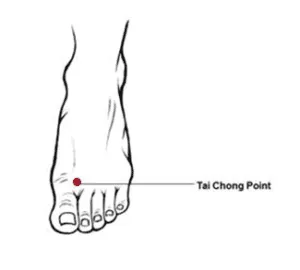-
 Art of Wellness Acupuncture & Traditional Chinese Medicine (TCM)11704 Wilshire Blvd, Suite 295, Los Angeles, CA, 90025
Art of Wellness Acupuncture & Traditional Chinese Medicine (TCM)11704 Wilshire Blvd, Suite 295, Los Angeles, CA, 90025
myartofwellness@gmail.com310-451-5522 Office Hours
MonClosedTue7:30 am --4 pmWed7:30 am --4 pmThu7:30 am -- 4 pmFri7:30 am -- 4 pmSat7:30 am -- 4 pmSunClosedOur office opens from Tuesdays to Saturdays 7:30 am to 4 pm, will be closed on Memorial day, Independent day, Labor day, Thanksgiving day, Christmas and New year.
-
Recent Posts
- How to Treat Dupuytren’s Contracture With Acupuncture and TCM
- How to Treat Nutcracker Syndrome With Acupuncture and TCM
- How to Treat Rosacea With Acupuncture and TCM
- How to Treat Perioral Dermatitis With Acupuncture and TCM
- Lymphatic Drainage With Acupuncture and TCM
- How to Treat Turf Toe With Acupuncture
- How to Treat Nerve Pain With Acupuncture and TCM
- How to Treat Watery Eyes With Acupuncture and TCM
- How to Treat Ovarian Cysts With Acupuncture and TCM
- How to Treat Dystonia With Acupuncture and TCM
- Can Acupuncture Help Bad Breath?
- How to Treat Atopy with Acupuncture and TCM
- Plantar Fasciosis Treatment With Acupuncture and TCM
- How to Protect Yourself When Air Quality Is Poor
- How to Treat Spinal Headache With Acupuncture and TCM
- How to Treat Sarcoidosis With Acupuncture and TCM
- Sign up to receive news and updates and get my free report:“The Top 10 Reasons to Try Acupuncture”

Anxiety
How to Treat Depression With Acupuncture and TCM
By Qineng Tan, L.Ac, Ph.D. & Xiaomei Cai. L.Ac., Ph.D.

More than ever, people are struggling with feelings of sadness, anxiety, and isolation. Feeling empty or worried all the time, having difficulty concentrating, or even having thoughts of suicide are all possible symptoms of depression. Acupuncture has been shown to be effective for helping manage and overcome both low-grade depression and major depression.
Everyone feels worried, sad, or frustrated due to life situations and problems that come up periodically. But feeling persistently fatigued with heavy emotions for days, weeks, or months on end is a signal that a person might be clinically depressed, or in the throes of a depressive episode.
The current global pandemic is causing most of us to feel exhausted with worry over all kinds of issues: personal health, grief for loved ones who are alone, ill, or have passed, desperation over financial concerns, and feelings of being trapped or deeply pessimistic.
People who already had mental health problems, especially anxiety or depressive disorder, may feel like they have less support than ever, as they cannot see friends or family, and may not have access to meeting with a therapist online. People who have other chronic health conditions, like cancer or chronic pain, may be struggling even more than they normally would, feeling distanced from the care they need.
Everyone is dealing with tremendous stress right now, and we know that stress causes all kinds of health problems. Many people are already used to annual bouts of depression due to Seasonal Affective Disorder (SAD). Young people, most of whom have had to adapt to a wildly different form of learning this year, as well as being cut off from their friends, are even more prone to teen depression. Parents and caregivers are putting in extra hours, and may begin to feel helpless and hopeless in the face of this daily struggle. Truly, everyone is at risk for feeling situational depression in times like these.
Remember that treatment for depression is available, and if you are feeling despondent, it is in your best interest to reach out for help. Integrative care that includes different kinds of therapy may work for people who have not been able to find help for their depressive disorder. We are here at Art of Wellness to provide effective help for depression and chronic anxiety through acupuncture and TCM.
Signs of Depression
Many times people hide or deny their feelings of depression, even from themselves. It is important to recognize the signs and symptoms of depression so that if you or someone close to you if affected, you will be able to get help. Signs that someone is suffering from depression include:
- Changes in weight or appetite
- Changes in sleep habits
- Drug or alcohol abuse
- Difficulty concentrating
- Lack of interest in activities
- Fatigue, feeling tired all the time
- Angry, irritable all the time
- Loss of libido
- Backache, headache, or digestive problems
Signs of depression in teens and depression in women may cause other symptoms, similar to those of anxiety, like racing and intrusive thoughts, extreme sensitivity to criticism, or withdrawal from family and friends. Having trouble sleeping, or sleeping more than usual are potentially signs of depression, as are significant changes in a person’s eating habits, sudden weight loss or weight gain. Depression can also affect cognitive function and memory.
Top 10 Types of Depression

Depression is a mental health condition that is caused by combinations of different factors, and takes many forms in terms of symptoms and behaviors. Mental health professionals differentiate this condition into different types of depression, according to duration, severity, and specific kinds of behavior, emotional, and thought patterns:
-
Major Depression or Clinical Depression – is defined as an episode of sadness or loss of interest or pleasure in external stimuli one usually enjoys that lasts for more than two weeks.
-
Persistent Depressive Disorder or Dysthymia – this is a chronic mental illness characterized by a pessimistic outlook and sad mood that persists for years. In this case, people may have what is sometimes called “high functioning” depression. Even happy occasions do not bring them joy.
-
Manic Depression or Bipolar Disorder – this condition is marked by extreme changes in mood and energy. A person might, at times, feel so low that they have suicidal thoughts or lose touch with reality, then their mood may suddenly shift into high gear, and they seem to have boundless energy and confidence. These shifts may occur over short or long periods of time.
-
Postpartum Depression – colloquially known as the “baby blues,” many women experience a form of depression in the months after having given birth. This type of depression occurs because of sudden changes in hormones, and is often marked not only by fatigue and inexplicable feelings of sadness, but also feelings of anxiety, panic attacks, and disturbing thoughts.
-
Seasonal Affective Disorder (SAD) – this type of depression is relative to the time of year, that is, a person regularly goes through a recurrent period of fatigue and low mood, a sense of heaviness, and irritability, or difficulty getting along with other people. Most people with SAD experience it during the winter months, but it can actually happen at any time of year.
-
Psychotic Depression – this is a form of depression that is accompanied by a break with reality, including delusional or paranoid thoughts, and hallucinations.
-
Premenstrual Dysphoric Disorder (PMDD) – is an extreme form of premenstrual syndrome (PMS) that interferes with daily life during the 7-10 days preceding the period. It is characterized by severe depressed thoughts that can become suicidal in nature. Then, after the period, the symptoms disappear for a few weeks, until the premenstrual phase occurs again.
-
Atypical depression – in contrast to its moniker, this type of depression may be the most common. Atypical depression refers to a predictable pattern of depressive feelings and behaviors, including oversleeping, changes in eating habits, problems with relationships, that overtakes one for a while, then clears up when some kind of positive event occurs. This can turn into a pattern of depression that comes and goes over the years.
-
Situational depression – this type of depression occurs in reaction to some kind of inciting event, maybe one that causes trauma or loss, or simply a major life change like a move or job change. This is a way that some people will adjust to circumstances and stressors in life, and it usually clears up within six months or so after the triggering event.
-
Disruptive Mood Dysregulation Disorder (DMDD) – this is a disorder that occurs in childhood marked by chronic, extreme irritability and a struggle to handle negative emotions. Children with this order may regularly act out or have tantrums when facing frustration.
While some types of depression are considered more severe than others, it is important to keep in mind that all kinds of depression are real health conditions than can and should be addressed before they become even more serious.
Treatment for Depression
In Western medicine, depression is seen mostly as a chemical imbalance affecting hormones and/or neurotransmitters, primarily in the brain. Depression can be triggered by a highly emotional event or difficult circumstances, and then, the chemical imbalance continues to cause negative emotions and disordered thoughts. The conventional medical solution for most forms of depression is a combination of psychotherapy, also known as talk therapy, and prescription medication, in the form of antidepressants or anti-anxiety medications.
Modern psychotherapy aims to help people with depression through the practice of coping skills, problem-solving around relationship issues, and resolving negative emotions.
Different types of antidepressant medication include selective serotonin reuptake inhibitors (SSRIs such as Zoloft, Lexapro, Prozac, Paxil, and Celexa), which affect the way the hormone serotonin is produced and absorbed by the brain cells, and serotonin and norepinephrine reuptake inhibitors (SNRIs like Effexor, Cymbalta, and Pristiq), which influence norepinephrine production, as well. All of these medicines basically work by allowing the brain to have more “good mood” chemicals available. Other, less commonly used medications include second-generation antipsychotics, such as Abilify, which are usually used to treat mental illnesses such as schizophrenia and bipolar disorder, but which are sometimes tried when other medications have not helped.
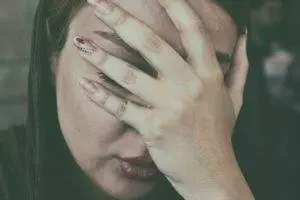
Many people feel that they benefit from the mood stabilisation these medications can provide. Generally, doctors recommend taking the medications for one to two years, to prevent relapses of the depressive symptoms. However, some people find that they have a hard time coming off of certain antidepressant medications, and unfortunately, there are many unpleasant side effects associated with these drugs.
More than half of the people who take antidepressants report side effects such as:
- Headaches
- Dizziness, brain fog
- Weight gain
- Dry mouth
- Restlessness, trouble sleeping, insomnia
- Sexual dysfunction, loss of libido
- Nausea, diarrhea, constipation, or trouble urinating
- Skin rashes or vision problems
In some cases, these side effects may seem manageable in relation to the severe depression they were feeling before, but for others, these problems compound their dissatisfaction with life. More serious side effects, like heart or liver problems can also occur, especially in older people, or because of interactions with other medications used to manage chronic conditions.
Some research studies have shown that acupuncture treatment can be used as an effective alternative to antidepressant medications, or as an adjunct that helps to offset some of the unwanted side effects. This study showed, also, that patients felt an improvement in their mood and quality of life after only a few weeks of acupuncture treatment, whereas the patients taking antidepressants took longer to register the positive effects.
How Acupuncture Treats Depression
TCM takes a holistic view of health that makes it very effective for treating depression. Going back thousands of years, TCM philosophy has always acknowledged the fundamental connection between mental health and physical health. Emotions and thoughts are as integral to wellness as the proper functioning of the organ systems. Imbalances in organs can cause emotional problems, and vice versa. So, when an acupuncture practitioner addresses mental illness such as depression and anxiety, she is looking at the whole picture. While a medical doctor may see varied symptoms such as digestive trouble, headache, irritability, and trouble sleeping as disparate problems to be solved by different specialists, or treated with different medications, a TCM provider views all of these issues as being part of a particular pattern and treats that pattern as a whole.
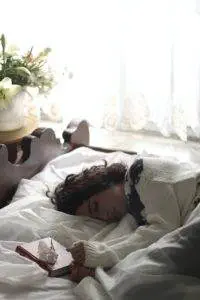
According to TCM, depression is caused by stagnation, or blockages in the Qi (life force energy). It is usually related to stagnant energy in the liver, spleen, heart or kidneys. Liver Qi stagnation can cause strong feelings of frustration, stomach pain and digestive trouble, heartburn or tightness in the chest, and headaches. Heart or Spleen Deficiency patterns cause worrying, trouble sleeping, and poor appetite. Chronic cases of depression with anxiety are often related to Yin deficiency, which causes irritability, restlessness, poor sleep, and back pain. An acupuncturist looks at all of these symptoms and treats the appropriate pattern with acupuncture and herbs. Acupuncture will also help people by relieving stress, and helping to restore better sleep.
One study looked at patients diagnosed with minor depressive episodes and generalized anxiety. Patients who received ten acupuncture treatments showed significant improvement over those who did not.
A study designed to help show the effect of acupuncture on neural circuity and chemistry as it relates to depression combined acupuncture with antidepressants when treating women with major depressive disorder. The patients receiving both showed improved functional connectivity in the corticostriatal reward circuitry of the brain.
Another study showed that electro-acupuncture treatment has as positive an effect on norepinephrine levels as amitriptyline – a medication commonly prescribed to treat major depression disorder and anxiety disorders.
Can Acupuncture Help Depression During Pregnancy and Postpartum Depression?
Some forms of depression are specific to the area of women’s health. PMDD, pregnancy depression and anxiety, and postpartum depression can all be helped with acupuncture treatment, without the risk of side effects.
It is important, both for their own health and that of the expected baby, that women suffering from depression during pregnancy or in the postpartum period seek help. However, there are risks involved in taking medications during pregnancy. Antidepressant use has been linked to birth outcomes such as low birth weight and premature delivery. Acupuncture, which can provide innumerable benefits during pregnancy, is an option worth exploring to relieve symptoms of depression and anxiety during pregnancy.
Acupuncture Near Me for Depression
Depression can make it difficult to take action. Feelings of hopelessness and isolation can cause people to feel that they are beyond help. Stigma around mental health can cause people to hide their anxiety and extreme moods from others. But depression is a real and treatable illness. Whether you have been struggling with depression for a long time, or have just begun to feel worried about your mental health over the past several months, please do not hesitate to reach out to us at Art of Wellness. We are here to help you get past this depressed period and begin to feel hope and purpose again.
*This article is for education from the perspective of Traditional Chinese Medicine only. The education provided by this article is not approved by FDA to diagnose, prevent, treat and cure human diseases. It should not stop you from consulting with your physician for your medical conditions. Traditional Chinese Medicine is based on Qi, which is an invisible force that usually cannot be observed by modern science. Because science focuses on testing ideas about the natural world with evidence obtained through observation, these aspects of acupuncture can’t be studied by science. Therefore acupuncture and Chinese herbs are often not supported by double-blind, randomized trials, and they are considered alternative medicine therapies in the United States.
How to Treat Anxiety With TCM and Acupuncture
By Qineng Tan, L.Ac., Ph.D. and Xiaomei Cai, L.Ac., Ph.D.

Everyone experiences feelings of anxiety or apprehension at times. Sometimes people suffer from excessive feelings of dread or panic, even when they are not in immediate danger. In some cases, the complex cascade of emotional and physical sensations encompassed by the term Anxiety is so pervasive that it becomes a chronic mental health condition. TCM and Acupuncture offer a natural, highly effective treatment option to reduce anxiety symptoms.
We are currently living in a particularly harsh reality in which human life is filled with setbacks and potential danger. There is always a chance that something bad might happen to you or someone close to you. In recent weeks, the coronavirus pandemic has understandably created a pervasive sense of worry amongst the population, and the numbers of people filling prescriptions for anxiety-related medications, antidepressants and sleep aids has increased dramatically.
Anxiety is clinically defined as a persistent feeling of worry, accompanied by physical sensations such as heart palpitations, dizziness, and sweating. Sometimes people describe it as being similar to the sensations you feel when you’ve tripped and you’re falling, except that the scary feeling persists for a long time; it doesn’t go away even when nothing is happening. Anxiety disorder is a very common mental health condition experienced by people of all ages; every year about 20% of Americans seek medical help for symptoms related to anxiety.
If you are feeling heightened levels of distress that are affecting your ability to sleep, focus, or care for yourself or others, please be assured that help is available. Acupuncture and other TCM treatment modalities offer a safe alternative to pharmacological drugs that can cause side effects and potentially lead to dependency and withdrawal symptoms. A qualified acupuncturist will conduct an in-depth consultation and create a program designed to specifically address each patient’s individual combination of symptoms and life situation.
What Are the Symptoms of Anxiety?
Doctors classify types of anxiety disorders into several sub-categories, including Generalized Anxiety Disorder (GAD), Social Anxiety, Obsessive-Compulsive Disorder (OCD), Post Traumatic Stress Disorder (PTSD), Phobia-related Disorders, and Separation Anxiety (anxiety in children).
The most common symptoms of various types of Anxiety include:
- Rapid or labored breathing
- Rapid heartbeat or tachycardia
- Feeling “on edge” or irritable
- Sweating
- Difficulty concentrating
- Memory loss
- Difficulty sleeping
- Fatigue
- Stomach upset
- Anxiety headache
Each person will present with a unique combination of symptoms and sensations, along with her own “triggers” or things that seem to cause the symptoms to manifest. Most people who seek medical care for their anxiety symptoms are either prescribed psychiatric tranquilizing medications such as Xanax or Atavan, referred for psychotherapy, or both. Some doctors use antidepressants such as Zoloft, Lexapro or Prozac to treat anxiety. These Selective Serotonin Uptake Inhibitors (SSRIs) may help reduce symptoms in some cases, but all of these types of medications can cause side effects and lead to dependency. TCM and Acupuncture treatments not only address specific symptoms of anxiety, but address the root causes of the disorder.
TCM Deals With All Types of Anxiety Disorders
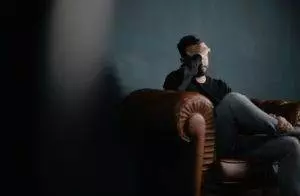
Anxiety, like depression and other mental health disorders, carries the disadvantage of being “invisible.” Other people, and even many medical professionals, simply can’t see physical evidence of the problem, and can’t empathize with the suffering involved. Well-meaning family members and friends might offer suggestions to “calm down” or reminders to stay positive, all with the implication that nothing is really wrong or that “it’s all in your head.” Being plagued with constant self-doubt further amplifies the problem. Anxiety is a real health issue, and TCM offers effective modalities to address it.
Modern medicine has only recently begun to make the connection between emotional and physical maladies. Traditional Chinese Medicine (TCM), on the other hand, has acknowledged for centuries that the mental, emotional and physical experiences of human beings are all inextricably linked. Sometimes a physical injury or traumatic experience can set the stage for a mental health problem. For example, a car accident that creates even minor injuries to the body might trigger future panic attacks, phobias, or Post Traumatic Stress Disorder (PTSD). Other times, a mental health condition like chronic Generalized Anxiety Disorder (GAD) can affect sleep, eating, and other behaviors to such an extent that a person becomes more susceptible to illness and disease. It would not be surprising to see an increase in cases of Agoraphobia (fear of leaving one’s home) and Obsessive-Compulsive Disorder (OCD, which sometimes causes compulsive hand-washing and cleaning as well as hoarding behaviors) as a result of the current coronavirus pandemic. People who experience multiple panic attacks may be diagnosed with panic disorder.
Anxiety disorders already tend to lead to feelings of isolation. Now that most people are spending far more time alone or sequestered with family members and roommates, already existing feelings of fear may be exacerbated. People who have never had to cope with anything beyond normal, mild anxiety may suddenly find themselves feeling real panic for the first time. Additionally, some might feel guilty or ashamed about reaching out for help for these problems when there are so many other people hurting for more apparent reasons. But there is real help for anxiety, and getting that help during this time of crisis makes sense. There is no need to suffer. Find acupuncture near me to address anxiety symptoms and the root causes before the problem becomes more severe and chronic.
Acupuncture for Controlling Anxiety
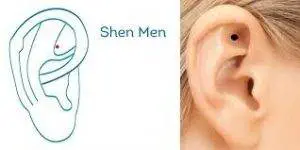
Conventional medicine generally attributes anxiety disorders to abnormal functioning of the brain and nervous system. The feelings associated with anxiety – the emotional sense of worry, the breathlessness and restlessness of the body, the behavioral instincts to freeze or to run – are all exaggerated responses to stress. Stress is the body’s natural reaction to perceived dangers in the environment. When something threatens us, the sympathetic nervous system kicks into gear, and the adrenal glands pump out the hormones that flood the body with energy–what is often referred to as the “fight or flight” response. Normally, once the threat has passed, adrenaline will take some time to move through the body and then dissipate, and a feeling of relaxation is eventually restored. When a person has an anxiety disorder, this hormone release can be triggered by thoughts, and the fear of the physical response itself becomes a part of the vicious cycle.
Acupuncture treatment has been shown to act upon the nervous system, facilitating the release of serotonin, endorphins and noradrenaline, all of which contribute to relaxation and a sense of well-being. Stimulation of specific points have been clinically proven to reduce perceived feelings of anxiety as well as reducing the heart rate and blood pressure of patients. Auricular acupuncture, which specifically uses points on the ear, has been shown to be effective for anxiety. This method is particularly useful, as patients can be fitted with a tiny needle that can be stimulated with gentle pressure as needed to help alleviate symptoms as they appear.
Auricular acupuncture has been used for thousands of years, not only in China, but all over the world. Modern critical analysis has demonstrated that auricular acupuncture affects the parasympathetic nervous system in ways that help alleviate pain and reduce anxiety symptoms. Electro-stim acupuncture, or electro-acupuncture, is another effective modality used by TCM doctors.
How Does Acupuncture Benefit Anxiety Relief of Panic Attacks?
One of the great advantages of acupuncture treatment over conventional methods of talk therapy and pharmacological intervention is that it has an immediately discernible effect. Patients often leave an acupuncture session with a deep sense of calm and relaxation. Reports of improved sleep usually follow quickly. In addition, the long-term effects of regular acupuncture sessions are cumulative, and people report a sustained decrease in episodes of anxiety and panic attacks.
One controlled study compared groups of patients treated with a regimen of acupuncture with moxibustion to a group prescribed a type of benzodiazepine medication. The results showed higher efficacy in reducing anxiety symptoms among the patients receiving acupuncture.
TCM Doctors’ Top 10 Suggestions on Self Care for Anxiety
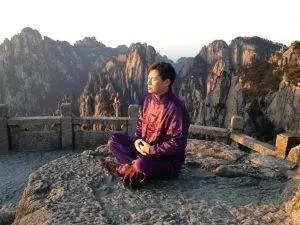
Here are some natural remedies for anxiety you can utilize at home. With consistent practice, these habits will help alleviate stress and reduce anxiety symptoms.
- Meditation for anxiety– Those struggling with anxiety may well be tired of hearing well-meaning friends suggesting they “Relax!” or “just breathe.” But studies have shown that regular meditation practice can significantly reduce anxiety. There are many methods; it is important to find a method that works for you. This study suggested mindfulness meditation may be especially effective.
- Waterfall Meditation – In this exercise, imagine yourself at the base of a waterfall. As you breathe in and out, picture the water gently raining down on you, trickling down each route until the tension inside you releases, relaxing parts of your body one section at a time. Allow your entire body to enter a peaceful and relaxed state. Let the image of the water wash away any stress or anxiety that burdens you.
- Physical Exercise – By now it has been well documented that regular exercise is good for health in every way, lowering the risks of all types of chronic disease. Movement helps reduce anxiety symptoms by reducing adrenal reactivity, increasing the output of endorphins and endogenous (naturally produced in the body) opioids, and even stimulating the growth of new brain cells. It is also suggested that exercise functions as a type of exposure therapy. When people become more used to the sensations of an increased heart rate, heavier breathing, and sweating due to cardiovascular activity, it increases their tolerance for these same symptoms when they appear as part of an episode of anxiety. If you are able to go for a walk or run while following social distancing guidelines, it is especially helpful to get some sun exposure, as well. Put on some music or a favorite workout video; rhythmic movement that engages the large muscle groups provides great benefits.
- Tai Chi and Chi Gong –These ancient traditional forms are “moving meditations” that work upon the endocrine circulatory, and nervous systems to balance energies and strengthen Qi.
- Good Eating Habits – Caffeine, sugar, processed and spicy foods can trigger anxiety. Complex carbohydrates like brown rice, barley, quinoa and oats are relaxing, as are nuts and chickpeas, which contain tryptophan. Now is a good time to become more intimately involved with preparing dishes at home, and this process can also be soothing: a mindfulness exercise that results in a healthy meal! Your TCM provider will provide more detailed instructions for a nutrition program for your specific situation.
- Stress Reduction –Reducing stress goes hand in hand with reducing anxiety. Especially now, carefully manage your daily activities so as not to become overwhelmed. Allot a short period of time for checking the latest news and catching up with friends; then consciously disengage from screens and virtual realities. Social media has already been called into question for its apparent increase of anxiety among teenagers, but it has a real impact on people of all ages. Comparing your situation and surroundings to the carefully curated content you see on sharing platforms can make you feel pressure, shame, a sense of inadequacy. Commit to being grounded in your immediate surroundings and grateful for the blessings that are in your life right now. Recognize that, while it is important to educate yourself about the novel coronavirus, many of the opinions being expressed online are not informed and are designed to provoke an emotional reaction. Avoid reading comments that you know might be triggering.
-

Acupuncture treatments can alleviate sleep anxiety. Sleep Better to Combat Sleep Anxiety – Repetitive, OCD intrusive thoughts and restless energy within the body can make sleeping difficult when you are experiencing sleep anxiety. Cortisol–another stress hormone–levels tend to rise in the evening, and many people register this sensation as anxiety at night. Eating simple carbohydrates like sweets or chips suppresses cortisol and offers a temporary feeling of relaxation. But consuming these foods or alcohol to artificially reduce stress leads to less restful sleep later. Dr. Tan and Dr. Cai can offer many suggestions for how to modify your habits to achieve a better night’s sleep.
- Learn a Language – Distance learning has quickly become an integral part of our lives. Many people are using their time at home to learn new skills. Now is a great time to learn a new language. Studying and practicing will help you focus your mind and instill a sense of accomplishment to help relieve anxiety.
- Structure Your Days – Even though daily life has taken an unusual turn, maintaining a consistent schedule helps keep hormone and energy levels more consistent. Rise and retire at about the same time each day. Eat regular meals. Set aside hours for work and much-needed time for rest and relaxation. Creating a structure for your life helps you feel that you are controlling what you can.
- Cognitive Behavioral Therapy (CBT) 5-4-3-2-1 Grounding Exercise – Use this exercise when feeling anxious or suffering a panic attack. This helps you ground yourself in reality by actively using your five senses. Look for the things, and then name them out loud.
- 5 – Count five things in your immediate environment that you can SEE.
- 4 – Count four things near you that you can TOUCH.
- 3 – Count three things near you that you can HEAR.
- 2 – Count two things you can SMELL.
- 1 – Count one thing you can TASTE.
How to Use 3 Acupressure Points for Anxiety Relief
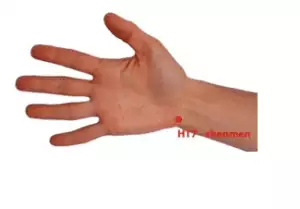
Acupressure is a technique patients can use anytime for symptom relief. Apply gentle, firm pressure to these points.
- Liver 3 is a grounding point that helps redirect rising energy downward. Located between the first and second toes, you will find a very tender spot. Try applying gentle pressure here to alleviate irritability, headaches, TMJ, and anxiety.
- You have probably seen the bands people sometimes wear around their wrists to prevent nausea. These are designed to put pressure on Pericardium 6, which quells queasiness. The point is located between the two tendons on your wrist, two fingers up from the wrist crease. Pressing on it is immediately calming. It helps to open the chest, as well, so if you feel tightness in the chest or shallow breathing, use this point.
- Shen Men, called the “Spiritual gate” point, releases heart fire, excitement, anger, irritation and anxiety.
Look for Acupuncture near me in Los Angeles for Anxiety
At Art of Wellness, one of the top 20 clinics in greater Los Angeles selected by experts, we are concerned that so many people are feeling the weight of these difficult times and having to go it alone. But we are here, committed to helping people whether they are suffering possible symptoms of COVID-19 or intense anxious feelings related to fear of the virus. Please do not hesitate to reach out to us at 310-451-5522 or email us at myartofwellness@gmail.com if you or someone you love is battling anxiety.
*This article is for education from the perspective of Traditional Chinese Medicine only. The education provided by this article is not approved by FDA to diagnose, prevent, treat and cure human diseases. It should not stop you from consulting with your physician for your medical conditions. Traditional Chinese Medicine is based on Qi, which is an invisible force that usually cannot be observed by modern science. Because science focuses on testing ideas about the natural world with evidence obtained through observation, these aspects of acupuncture can’t be studied by science. Therefore acupuncture and Chinese herbs are often not supported by double-blind, randomized trials, and they are considered alternative medicine therapies in the United States.
How to Treat Menopause Symptoms With Acupuncture and TCM
By Xiaomei Cai, L.Ac., Ph.D.

Menopause is a natural, transformative process that is experienced by half of the population of the world. Like any life process that involves change, it can be accompanied by intense discomfort. Menopause symptoms affect women in middle age physically, emotionally, and mentally. TCM and acupuncture treatment are ideally suited to bring balance and allow women to navigate this time with greater ease and menopause symptom relief. Several studies have shown that the three most commonly prescribed forms of Menopausal Hormone Therapy (MHT) or Hormone Replacement all increase the risk of breast cancer, and the risks increase the longer these therapies are used. Acupuncture and TCM treat menopausal hot flashes effectively without any side effects.
Signs of Menopause Symptoms: Hot Flashes, Night Sweats and More
Menopause is technically defined as when a woman has not had a period for a full twelve months. The period of time during which a woman begins experiencing symptoms related to menopause is actually the pre-menopausal or “perimenopausal” state. This phase can unfold over the course of a few months or up to several years; the average amount of time is about four years. Most women begin experiencing perimenopause in their 40s, although some women begin feeling different and having irregular periods as early as their 30s, and other women don’t feel changes until their 50s.
Perimenopausal symptoms and signs can include:
- Irregular menstrual periods
- Hot flashes, hot flushes, night sweats
- Difficulty sleeping, sleep apnea, snoring
- Vaginal dryness
- Low libido
- Urinary incontinence
- Loss of bone density
- Higher “bad” cholesterol and lower “good” cholesterol
- Anxiety, irritability, depression, PMS or PMDD
- Headaches
- Weight gain
- Itchy skin, pruritus
About 80% of women will experience hot flashes at some point during their perimenopausal phase. These sudden hot flushes are caused by lower estrogen levels, which can confuse the brain’s typical regulation of internal temperature. These episodes can feel really disconcerting and disruptive.
Acupuncture for Menopause Treatment and Menopause Supplements
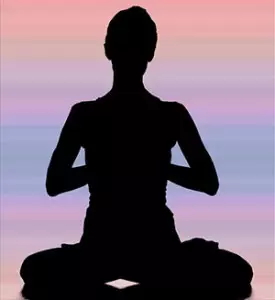
Studies have shown that acupuncture treatments can reduce the frequency of hot flashes. As few as three treatments produced significant positive results, while a full course of treatment (at least eight sessions) provided relief for many women for up to six months. In addition to relieving hot flashes, acupuncture also improves quality of life in many other ways: reducing headaches and other body aches, alleviating anxiety and depression, and improving sleep. TCM also offers customized herbal formulae that support the body’s hormone balance and help with menopause symptom relief. In many ways, the effects of perimenopause and menopause are not quantifiable, as some are more emotional in nature. This change occurs not just in the body, but in the mind. At this time, a woman is seeing herself differently, reevaluating her own sense of identity and purpose, and in some cases, shifting her focus and energies in life.
Acupuncture for PMS Symptoms and Menopause
Physically, a woman goes through many significant changes over the years, and different factors come into play. If a woman’s body is out of balance — due to trauma, stress, illness, injury, diet, environment, etc.–she may experience difficulties with her female organ function. Painful periods, irregular periods, cysts, fibroids and endometriosis are all common conditions — but they do not happen without some imbalances causing them. A lifetime of choices, experiences, pains and pleasures add up to create the health status we live with now, in this moment.
Women’s health issues can be addressed, at any stage of life, with acupuncture and herbs, as well as the right kind of food and lifestyle choices. If a woman finds and partners with a good healthcare practitioner, and practices a lifestyle that helps her achieve optimal health, she does not have to suffer through years of PMS, unpleasant symptoms during pregnancy like morning sickness, nor through years of menopausal symptoms, either. Unfortunately, many women do not know there is an alternative to using pain relief medicines, oral contraceptives and hormone replacement to manage symptoms. These drugs do not offer a real solution to the problems; they mask them. As women, we are often expected to simply accept these problems and learn to cope. But why settle for that, when we have the means to correct them?
What is a Natural Remedy for Hot Flashes? Acupuncture and Menopause Supplements
TCM looks at female care as “ovarian care.” Besides paying attention to our liver, heart, lungs, and kidneys, we also focus on menstrual and premenstrual care, pregnancy and postpartum care, and menopause care. These are unique to women. The ovaries are the major players when it comes to female hormones, cycles, and reproductive health. Girls, young women and older women can all benefit from regular treatment, herbal supplementation, and lifestyle improvements to encourage healthy and smooth functioning of these processes. If, as a younger woman, you are able to manage your hormones, then, when menopause comes, it hopefully will not be too much of a problem. If you are already experiencing menopause symptoms, it is not too late to get Yin and Yang balance restored, so that you can enjoy this phase of life and many healthy years to come!
According to TCM, most menopausal disorders fall under kidney and/or liver Yin deficiency. This manifests in hot flashes, waking often at night around 3:00-4:00 a.m., dreamy light sleep, irritability, memory loss, dry eyes, mood swings, and irregular periods. A smaller percentage of symptoms fall under kidney Yang deficiency; low back soreness, incontinence, water retention, fatigue, indigestion, and weight gain. We use very specific acupuncture points to help with each of these different problems, and are able to treat each woman’s unique combination of issues. We also have our unique techniques (needling and massage) and herbal products to help skin stay firm and smooth.
8 Self-Care Best Practices for Menopause

Acupuncture and herbal modalities have been taking care of these women’s health issues for thousands of years. Besides seeking these professional services, there are many things you can do at home to facilitate a smooth transition:
- For Yin deficiency, stick with cooling and juicy foods like fresh veggies, fruit, yams, sweet rice, mung beans, lotus roots or seeds. Stay away from alcohol, coffee, and spicy foods which increase internal fire or heat. Snacking on Goji berries is recommended, drinking chrysanthemum tea, chamomile tea or Art of Wellness’s own Night Tea can help you rest and sleep better.
- For Yang deficiency, drink warm lemon water upon rising, eat more cooked and warm food, nuts, especially walnuts and pecans, stay away from dairy, icy foods and drinks and greasy, heavy meals. 20-30 minute hot foot spa before bedtime is recommended. Rub the low back along the midline of the spine and on both sides until very warm.
- For saggy or loose skin, facial rejuvenation acupuncture needling will help stimulate collagen production and improve facial circulation.
- Speed-walk 30-45 minutes per day.
- Rub hands to warm them, then rub the soles of each foot 100 times. Practice daily.
- Meditate 20 minutes daily, in the morning or ideally, at bedtime.
- Suggested Menopause Meditation: focus on the lower abdominal area (Dan Tian), until it feels warm. Then, move the warm sensation into your kidney area.
- Try this Lotus smoothie recipe. Good for anyone, but especially for women experiencing menopausal symptoms: ½ cup lotus seed, ½ lily bulbs, 1 tablespoon mung beans, 1 tablespoon sweet rice, 10 pieces of honey dates. Rinse all ingredients but dates. Add 6 cups of water, cook for 20 minutes. Blend. Garnish with a few goji berries. Make 4 servings. Serve warm for breakfast, or cold for an afternoon snack. Feel free to add fruit, such as banana, berries, apple, pear, etc.
If you or a woman you care about is experiencing menopause symptoms, look for acupuncture near me, and call Art of Wellness, Santa Monica, Los Angeles, CA. Our clinic is one of the top 19 pick among 825 similar clinics in the great Los Angeles area. Our doctors have over 30-years experiences of practicing TCM and acupuncture. Dr. Cai is a specialist in all women’s health issues.
*This article is for education from the perspective of Traditional Chinese Medicine only. The education provided by this article is not approved by FDA to diagnose, prevent, treat and cure human diseases. It should not stop you from consulting with your physician for your medical conditions. Traditional Chinese Medicine is based on Qi, which is an invisible force that usually cannot be observed by modern science. Because science focuses on testing ideas about the natural world with evidence obtained through observation, these aspects of acupuncture can’t be studied by science. Therefore acupuncture and Chinese herbs are often not supported by double-blind, randomized trials, and they are considered alternative medicine therapies in the United States.
How to Treat Stress with TCM and Acupuncture
by Qineng Tan, L.Ac., Ph.D.
Nowadays, we hear pretty constantly that everyone is “under a lot of stress.” But what is stress?
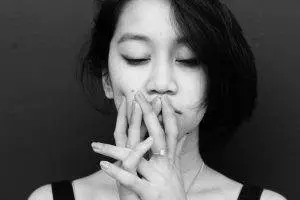
Stress is a natural reaction in the body to any difficulties or changes that we face in life. Stress affects health at every level: physically, mentally, and emotionally. Stress can bring a lot of negative effects to your health and your career. TCM and acupuncture offer a unique treatment to stress management without any of the side effects that anti-depression drugs cause. Acupuncture treatment often brings people immediate stress relief, as they leave the clinic feeling calm, relaxed, sometime even euphoric. But TCM and acupuncture can also provide meaningful reduction in the toxic effects of long-term stress over time.
In this article we will discuss stressors, stress symptoms, and how to combat the negative effects of stress on your body, mind and spirit.
What Are Stress Symptoms?
“But he was so young!” “But there wasn’t anything wrong with her!” Have you heard of someone you know–maybe a friend or a relative, maybe someone famous you admire–dying, suddenly? It’s hard to take it in; we don’t want to believe that these things can happen, especially when someone is only middle aged. It forces us to look at our own lives. Are we taking the time to take care of ourselves? Or are we rushing around from one crisis to another, always stressed out?
Stress is the body’s natural reaction to any difficulties that appear in our lives, physically or emotionally. It’s a normal response to adverse conditions. It’s actually healthy to experience some low-degree, short-term stress occasionally, because this lets the body practice protecting itself. Unfortunately, our modern lifestyle creates a lot of stressful situations for us to endure, and most people are not taught or encouraged to release the effects of stress from their bodies and minds. When stress builds up, it can lead to health problems. It may be that when you go to an M.D. who orders tests, nothing shows up in a scan or a blood test. But that does not mean you don’t have a serious problem.
Chronic stress can cause a variety of symptoms and illnesses and affect overall health and well-being. Many diseases, including cancer, can be linked to stress. Job changes, the illness or death of a family member, relationship issues, financial or business difficulties, caring for and educating children – we all face these stressors at one time or another. For some people, the problems begin in childhood. If a child experiences trauma–parents fighting, or bullying at school, for example–that kind of severe stress can develop into permanent health problems as he or she grows up.
What Does Stress Do to Your Body?
Stress can affect all systems in the body. It starts with the central nervous system and the endocrine system. When something unusual happens, the brain gets a signal: something needs to be done! The brain sends out a message, alerting the body to start producing hormones like adrenaline and cortisol. Adrenaline increases the heart rate, elevates the blood pressure and boosts energy supplies. Cortisone increases sugar in the bloodstream, enhances the brain’s use of glucose and increases the body’s ability to repair tissues.
The body’s initial reaction to stress is to protect itself. But if you are under this kind of stress constantly–think about it–your body will keep producing adrenaline, causing the heart to beat constantly at a high rate and keep the blood pressure high. Eventually, the body will become exhausted, leading to chronic fatigue, hypertension, diabetes, risk of stroke and heart attack. The lungs become vulnerable, which can trigger asthma, and allergic reactions such as eczema or hives rash. When the cortisone level is high, it causes a constant immune response. Eventually, the immune system becomes imbalanced.
When stressful periods are prolonged, the body can lose the ability to shut off the alert that says something is wrong: what we call the “fight or flight” response. Say you send a soldier to a war zone. The soldier’s job is to shoot the enemy. When the enemy approaches, the soldier starts to shoot. But if the soldier is there fighting for days, weeks, years, and his job is to keep shooting, at some point he stops recognizing who is an enemy or who is an ally. He will shoot anybody. Likewise, the body loses the ability to recognize what is good and what is not good. Stressful life events are often a main factor in the onset of an autoimmune condition, like ALS, MS, lupus, or rheumatoid arthritis. When a person has experienced shocking, perhaps life-threatening, events such as being attacked or surviving in a war zone, he or she may exhibit PTSD symptoms, depression, or panic attacks.
When a person is under chronic stress, the liver has to work much harder. We rely on the liver to clean the blood, but if it gets tired out, it can’t do its job. So toxins don’t always come from outside the body; they can come from stress, when the body becomes more acidic and toxic, increasing inflammation and risk of cancer. Liver Qi problems are a major factor in women’s health problems, including PMS and PMDD.
When we’re upset, the appetite changes, causing us to eat too much or too little, affecting our nutrition. Many digestive problems are related to long term stress: heartburn and reflux, ulcers, cramping, nausea, vomiting, obesity, constipation, bloat, IBS, diarrhea. Sometimes stress shows itself externally, on the surface of the skin, as with eczema or psoriasis.
Stress causes the muscles to become tight and makes the nerves more sensitive. This causes more pain and inflammation.
The reproductive system and the sex drive are, naturally, affected by hormone imbalances. For women, this can cause PMS, fertility issues related to ovarian function, blocked tubes, or unstable uterine lining, and more severe menopausal symptoms. For men, long term stress can cause the testosterone level to drop, the prostate and the urethra to become inflamed and prone to infection. With all of this, it is no wonder that libido and sexual function (erectile dysfunction) take a dive, too.
Stress Management by TCM and Acupuncture
TCM is based on the philosophy that the body, mind, and spirit are inextricably linked. It is only in recent years that Western science has begun to acknowledge the
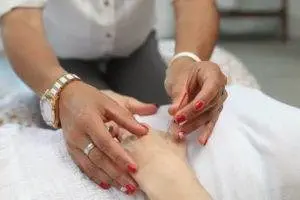
connection between the emotions and our physical health. In TCM, we always look at the whole person. If the emotions are out of balance, the body’s functions will be, too. Keep in mind that without a spirit, the body is nothing more than a container: a box. Likewise, if the body is not healthy, the spirit doesn’t have a good home to live in. That is why we treat stress, emotional fluctuations, and balance the body’s organ systems all at the same time with acupuncture.
Acupuncture is one great way to help you manage your stress and protect you from permanent health damage. Even though you may not be able to avoid stress, you do have the power to manage stress better so that it can’t build up, hurt you internally, and turn into serious health issues.
Top 7 Habits for Stress Relief
Every day, we encounter people and situations that cause frustration. Sometimes several minor incidents over the course of a day can build up until we feel we are at the end of our ability to cope. Other times, we are hit with a big problem that we have no choice but to face. These stressors are unavoidable. What we can do is pay attention to our responses, and train ourselves to respond more calmly when situations arise.
Here are some things you can do in your daily life to manage stress.
- Change the way you view problems. It is human nature to protect ourselves from danger by recognizing the negative energies coming at us. But we can become too accustomed to looking for the “dark side.”A lot of time we needlessly take things negatively. Say you wake up to the sounds of a bird, chattering in a tree. You can think, “Ah, the beautiful music of nature!” Or you can get annoyed. Same situation, different response. Learn how to think positively. Often I ask a patient to “show me your hand.” They show me the palm side, but don’t think to look at the back of the hand. In the world, nothing can exist that has one side only. This is the concept of Yin and Yang; nothing is only good or only bad. There is good and bad in everything. Learn to pay attention to both, but “accentuate the positive.”
- Connect yourself to nature; consciously choose to make yourself one with the Universe. Connect to energy outside of yourself by going to the mountains or the

Spending more time outdoors can help alleviate stress beach, walking barefoot on the sand and listening to the waves. Sit by a river and feel the flow of the water. When you feel anger inside, go out and face something – a mountain, or the woods – breathe out, remove that negative energy from your body, absorb positive energy; make that exchange. By doing this, you gain the perspective of playing a small, yet integral part within the greatness of the universe. This will release stress and give you new strength.
- Learn some techniques: Tai Chi, yoga, meditation, Qi Gong. Tai Chi, for example, trains you physically and emotionally at the same time, cultivating your internal Qi. Deep breathing will make your body more balanced and calm; exhale negative energy and inhale fresh air and energy.
- Engage in regular physical activity, especially cardiovascular varieties. Walk, jog, bike, swim. Going outdoors, getting fresh air and sunshine, is even more beneficial than going to the gym.
- Encourage yourself to engage in some social activity. Stress can cause sadness and depression. People tend to close themselves off. So, you must push yourself to go out, keep up your activities. Talking with friends will release the stagnation from your body and mind. Sign up to volunteer; helping other people will reduce your stress.
- Take time for a hobby. Whatever you enjoy: walking, swimming, reading, listening to music, going to dance class, fishing, golfing. Do it regularly. But it should be something active for your body or mind. Inactive pastimes– like watching television or playing video games, surfing the internet–may seem relaxing, but they can actually increase stress long term. Keep time spent on those passive activities to a minimum.
- Work on your sense of humor! When you laugh, you are happier and so are others around you. Be generous with your positive energy and others will be there to help you when you need it.
Managing stress will pay off, not only by making you happier, but probably also allowing you to enjoy a longer and healthier life. Practicing stress management will help you to recover from existing conditions and prevent other issues from becoming serious in the future. If you need treatment and look for acupuncture near me, come to our clinic Art of Wellness, Santa Monica, Los Angeles, CA. Our clinic is one of the top 19 pick among 825 similar clinics in the great Los Angeles area. Our doctors have over 30 years of experience of practicing TCM and acupuncture.
How to Sleep Better with Acupuncture and TCM
By Qineng Tan, L.Ac., Ph.D.
Do you suffer from insomnia or do you have trouble falling asleep and staying asleep? Acupuncture and Traditional Chinese Medicine (TCM) offers many solutions on how to sleep better without sleeping aids. TCM stresses the importance of getting a good night sleep. Chinese medicine has tools such as; exercise, Chinese herbal medicine, acupuncture, and meditation all which can help you get a good sleep so you can function at the highest potential throughout the day. Below you will read about TCM and the history it provides in regards to sleep and the many tips that can help you get the best sleep tonight.
History of Sleep with TCM
Sleep is a part of the interplay of yin and yang: yang energy is dominant when we are awake and active, and yin energy rules sleep. Night is yin; daylight is yang. This is all in keeping with the holistic, universal nature of TCM (Traditional Chinese Medicine) theory. Our bodies are designed to work with the movements of the earth, sun, and moon. When a person experiences insomnia, either hard to fall asleep or wake up often then difficult to fall back to sleep, there is a lack of balance. The body is out of sync with its environment. The yang energy is taking over, or not interplaying with yin appropriately.
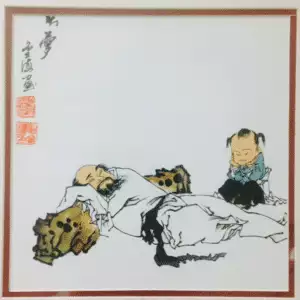
In TCM terminology, “Shen” is the spirit, the energy which controls our mental activities and thought. During sleep, Shen “hides” in the organs – predominantly the Heart and the Liver – resting, so that it can function with sharpness during our waking hours. Insomnia, in TCM, is often viewed, then, as a problem of the Heart system, or the Liver system. If one of these major organs is unable to “house” the Shen, then the Shen will wander restlessly, causing sleeplessness.
Protective Qi cycles through the body continuously, but it follows different paths along the meridians at different times of the day and night. During the day, protective Qi, which fights off pathogens, moves through the yang meridians, and during the night, it flows through the yin meridians. If you find yourself waking up at a particular hour in the middle of the night every night – or feeling sluggish at one particular time every day – it is probably related to some deficiency of Qi in that area.
Between the hours between 1:00 and 3:00 a.m. the liver meridian is actively supplying Qi to the liver system so that it can clean toxins from the blood. Then, between 3:00 and 5:00 a.m., the freshly cleaned blood and energy is being delivered to the organ systems. It is especially important to be sleeping soundly during that time. The liver does all the heavy lifting of cleaning and detoxifying the blood and therefore, the whole body. If the liver is stinted of its full rest and rejuvenation, night after night, we can be left feeling truly sick and tired.
Sleeplessness may be the central problem for some people; for others, it’s just a part of the big picture. Many people have gone so long without restful sleep that they have become used to it and just consider it their new “normal.” When you come in to Art of Wellness for a visit, our doctors will ask many questions to get a sense of what kind of sleep problems you’re having, including other symptoms that may be related to the same root issue.
- Having trouble falling asleep may be related to an excess condition of the liver and/or gall bladder.
- Waking easily and then having trouble falling back to sleep may point to a deficiency of the Heart Yin or too much internal heat.
- Nightmares may indicate a gall bladder meridian problem, while repetitive, literal dreams (about work, for example) might indicate a heart/spleen problem.
Sleep problems can be related to other conditions, such as depression, menopause in women, fibromyalgia, chronic fatigue syndrome, and cardiovascular disease.
How to Make Winter A Time of Rest and Renewal
Getting a good night sleep is always important, but in the Wintertime. Nature and our bodies are really asking us to rest more, and more deeply, than we do during other times of the year. This is a time for the body to store energy. If we go at a frantic pace, and behave the same way we do in the middle of summer, we will become depleted.
Unfortunately, our current culture does not necessarily support this idea. It seems we are asked to do more and be more than ever during the rush of the winter holiday season. It really is vital to prioritize “doing less” in order to preserve good health.
People with sleep problems seek tips for help. The practices in acupuncture and TCM help you to be calm. Visit the link and read some TCM tips for sleep.
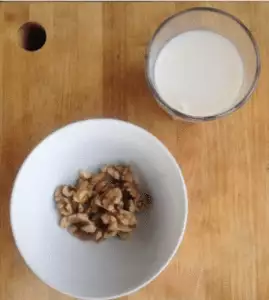
Top 20 Tips For Creating Calm so That You Can Get A Good Sleep
- Choose carefully how many social commitments you make. You don’t have to attend every gathering – only the ones that are meaningful to you. If it feels more like an obligation than fun, make a plan to stop in, extend your greetings, and then leave early. This way, you won’t overeat, drink too much, and you can still get to bed a reasonable hour
- Don’t exercise too vigorously close to bedtime. An evening walk, or gentle program of Tai Qi or yoga will help you work out excess energy with stimulating you further
- Deep breaking techniques: using you lower abdomen, inhale deeply. Hold it for about 5 seconds, and then exhale slowly through your mouth. Repeat ten times. Deep breathing exercises not only relax your mind, but they help to dispel negative Qi from the body before bed
- Create an oasis of calm in your bedroom, with good ventilation, restful colors and no devices. Set a time, half an hour to hour before going to bed, when you will discontinue watching TV or looking at your computer and phone. The light stimulus from the screen is not helpful for falling asleep. Reading a book, writing in a journal, coloring in a coloring book, are all activities that help you wind down for the night.
- Change your eating habits: many people wake up around 3 AM and find it difficult to fall back asleep. This may be cause by low blood sugar level due to the over activity for the adrenal gland. For a better sleep, try to balance your blood sugar level daily by eating small portions of food about every 3 hours and drinking a glass of warm, low fat milk or eating a handful of nuts—such as raw walnuts or almonds, before bedtime. It helps to balance your blood sugar. Waking up in the middle of the night can be caused by fluctuating insulin levels – the result of too much sugar or alcohol in the evening.
- Keep your feet warm by soaking them in hot water for 15-20 minutes before bedtime. Also, massaging the bottom of the feet can help to stimulate key kidney points. Give a good, fast rub to the center of your soles for a few minutes to warm them while getting into bed.
- Stimulating acupressure points just before bedtime can be helpful. Use your thumb or fingertip to apply moderate pressure and rotate clockwise for 2-3 minutes.
- Shen Men, called the “Spiritual gate” point, releases heart fire, excitement, anger, irritation and anxiety.
- Tai Chong, a liver point can help alleviate insomnia due to excessive heat or stagnation in the liver, which can cause feelings of depression, stress, sadness.
- Take off any constricting clothing (underwear), and wear loose, comfortable pajamas for bedtime.
- There is an old saying: “sleep like the crescent moon.” Sleeping in a fetal position on your right side puts your heart above your liver, which helps drain blood, giving the heart some relief and extra nourishment to the liver. It also helps food move through your digestive system properly.
- Keep away from interruptions: Turn off your phone after dinner or keep a note book by your bed. If you keep thinking about sometime important to do, write it down.
- Listen to calm and relaxing music
- Sleep and wake at the same time every day, yes that includes weekends. Do not stay in bed for too long even when you do not have to go to work. Your body needs to have a regular sleep-wake cycle in order to function at its maximum

Shen Men Point - Reduce the water temperature for baths and showers: when the water temperature is well about body temperature, your body heat increases. Then when you get out of the water, your body heat decreases. Try to avoid such fluctuation of the body temperature.

Tai Chong Point - Keep your bedroom simple and clean: limit the number of electronic devices such as TV’s, computers from your bed room
- Do not play video games at night
- Obey the 20-minute rule: if you do not successfully fall asleep in twenty minutes, get up and do something else until you feel tired and ready to sleep again.
- Waterfall Meditation. In this exercise, imagine yourself at the base of a waterfall. As you breathe in and out, picture the water gently raining down on you, trickling down each route until the tension inside you releases, allowing your entire body to enter a peaceful and relaxed state.
- Oneness Meditation. Just as in the Waterfall exercise, picture yourself standing beneath a waterfall. This time, however, instead of relaxing parts of your body one section at a time, allow your entire body to relax simultaneously. Let the image of the water wash away any stress or anxiety that burdens you.
If you have tried all of these things are still not sleeping well, please come see us to find the underlying problem. Acupuncture and herbs can help address and correct deeper issues that are affecting your ability to find rest and peace. If you find you are experiencing insomnia or any other sleep disturbance, seek out solutions. Left unaddressed, a sleep problem can become chronic and debilitating. Talk to us, so we can help you pinpoint and fix the problem with lifestyle adjustments, acupuncture treatments, and herbal formulae.


